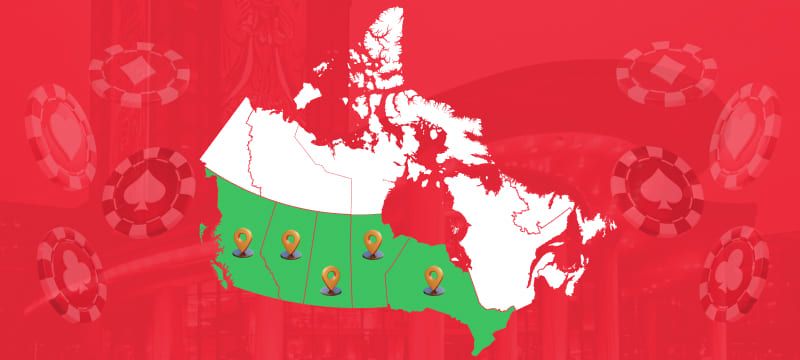Indigenous Casinos in Canada

The Canadian government has allowed provinces the authority to regulate best online gambling since 1985. However, only in the 1990s Indigenous casinos were allowed on reserve lands. In this article, we delve into the history of Indigenous casinos and highlight the top indigenous casinos across Canadian provinces.
History of Indigenous Casinos in Canada
The pivotal moment for Indigenous casinos was in 1996. That’s when Saskatchewan’s First Nations Gaming Act granted indigenous communities the right to regulate gambling establishments on their lands. These First Nation casinos also must comply with the regulations enforced by their respective provinces.
It was also established that Indigenous casinos in Canada are operated by one of three models:
- A group of First Nations can apply for a provincial gaming license as a non-profit entity.
- They can establish a formal agreement with the host province to operate a casino.
- They can obtain a non-charitable gaming license through a provincially-approved licensing body to conduct gambling activities on their lands.
This framework allows the regulation and development of Indigenous-run casinos. It ensures that they adhere to both provincial and federal rules. At the same time, it also increases economic opportunities within Indigenous communities.
Discover The Top Indigenous Casinos

To help you decide where to play, we’ve researched the Indigenous casinos spread across several Canadian provinces. We've provided an overview for each province and attached a list of the most notable Indigenous land-based casinos.
Alberta
First Nations gaming facilities in Alberta operate with the Alberta Gaming, Liquor & Cannabis (AGLC) issued license. With 27 First Nation casinos in Alberta, we’ve selected the most popular ones worth visiting.
| Casino | Operating framework | Location | Size | Games | Amenities |
| River Cree Resort & Casino | Commercial casino | 300 East Lapotac Blvd Box 179. Enoch, Alberta T7X 3Y3 | 24,000 square feet | 1,400+ slot machines, 46 table games, 10 VLTs | Hotel, entertainment, restaurants, spa |
| Casino Dene | Charity, non-profit casino | Route 28 &, AB-897, Cold Lake, Alberta T9M 1P4 | 20,000 square feet | 250+ slot machines, 10 table games | Dining, live events, hotel |
| Grey Eagle Resort & Casino | Commercial Casino | 3777 Grey Eagle Dr, Calgary, Alberta T3E 3X8 | 84,000 square feet | 900+ slot machines, 40 table games | Hotel, entertainment, restaurants, spa, event center |
| Stoney Nakoda Resort & Casino | Commercial Casino | 888 Nakoda Way, Kananaskis, Alberta T0L 1N0 | 70,000 square feet | 250+ slot machines, 15 table games | Hotel, restaurants, golf course, event space |
Manitoba
Indigenous casinos in Manitoba are licensed by the Manitoba Liquor & Lotteries corporation. First Nations have settled agreements with the organization to manage casinos on their land. The revenue aids numerous community initiatives.
| Casino | Operating framework | Location | Size | Games | Amenities |
| Aseneskak Casino | Commercial casino | MB-10, Opaskwayak, Manitoba R0B 2J0 | 20,000 square feet | 170+ slot machines, 3 poker tables | Dining, Stay & Play packages with partner hotels in the area |
| South Beach Casino & Resort | Commercial casino | 1 Ocean Dr, Scanterbury, Manitoba R0E 1W0 | 40,000 square feet | 570+ slot machines, 12 table games | Hotel, dining, events |
Ontario
With renowned casinos like Rama, Ontario boasts a strong Indigenous gaming presence. These casinos operate under the supervision of the Ontario Lottery and Gaming Corporation (OLG).
| Casino | Operating framework | Location | Size | Games | Amenities |
| Casino Rama Resort | Commercial casino | 5899 Rama Rd, Orillia, Ontario L3V 6H6 | 192,000 square feet | 1,800+ slot machines, 47 table games, | Hotel, dining, entertainment, spa, meeting rooms |
| Great Blue Heron Casino & Hotel | Commercial casino | 21777 Island Rd, Port Perry, Ontario L9L 1B6 | 25,000 square feet | 560+ slot machines, 20 table games | Hotel, dining, events, concert venue |
| Golden Eagle Charitable Casino | Commercial casino (portion of profits go towards charitable causes) | Golf Course Rd. Kenora, Ontario P9N | 7,500 square feet | 450 bingo seats | Dining, events, hotel, entertainment |
Saskatchewan
In Saskatchewan, locals and tourists have a variety of casinos to choose from, including the indigenous casinos operated by Saskatchewan Indian Gaming Authority (SIGA). They are regulated by Saskatchewan Liquor and Gaming Authority (SLGA) and offer gaming in different areas of the Saskatchewan province.
| Casino | Operating framework | Location | Size | Games | Amenities |
| Dakota Dunes Casino | Commercial casino | 204 Dakota Dunes Wy, Whitecap, Saskatchewan S7K 2L2 | 84,000 square feet | 590+ slot machines, 18 table games | Hotel, dining, entertainment, golf course |
| Living Sky Casino | Commercial casino | 1401 North Service Rd E, Swift Current, Saskatchewan S9H 3X6 | 60,000 square feet | 200+ slot machines, 5 table games | Dining, entertainment, event space |
| Gold Eagle Casino | Charity, non-profit casino | 11902 Railway Ave E, North Battleford, Saskatchewan S9A 3K7 | 45,000 square feet | 330+ slot machines, 8 table games | Hotel, dining, entertainment |
British Columbia
Although, more modest-sized than in other provinces, British Columbia also has few Indigenous community operated casinos. They are regulated and licensed by the British Columbia Lottery Corporation (BCLC).
| Casino | Operating framework | Location | Size | Games | Amenities |
| Casino of the Rockies | Commercial casino | 7777 Mission Road, Cranbrook, British Columbia V1C 7E5 | 19,000 square feet | 210+ slot machines, 4 table games | Hotel, dining, events, golf course, spa |
| Chances Cowichan | Commercial casino | 436 Cowichan Way, Duncan, British Columbia V9L 0B2 | 16,000 square feet | 160+ slot machines, 250 bingo seats | Dining, events |
How These Casinos Benefit Indigenous Communities
Besides providing entertainment, casino establishments run by Indigenous communities make significant contributions. They positively impact the social, economic, and cultural aspects of First Nations.
- Employment: Casinos require proper infrastructure, from building the complexes to providing casino operations. This creates opportunities for new jobs and improves the employment rate of indigenous communities.
- Contribution to culture and heritage: Although most of these casinos are commercial, many dedicate part of their profits to First Nation charities. It can include donations to cultural programs and events.
- Boosted tourism: Casinos attract tourists, both local and from overseas. In addition to gambling, they spend money on accommodation, retail, and dining.
Regarding profits made by First Nation casinos in Canada, Saskatchewan rates just sixth, with Alberta and Ontario holding their first places, and Manitoba and British Columbia also following with the ratings. Alberta's leading position isn't shocking since there are over two dozen gambling spots in this province, including six First Nation casinos.










